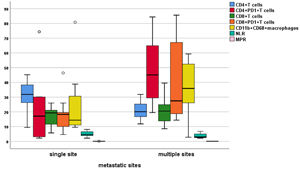A Complex Interplay of Tumor Microenvironment Could Enhance Cholangiocarcinoma Progression Even After Surgery: A Prospective Study
DOI:
https://doi.org/10.14740/jocmr5201Keywords:
Cholangiocarcinoma, PD-1+ expression, Macrophages, PBMNCs, Progression-free survivalAbstract
Background: The current study was conducted to explore the impact of macrophages and programmed cell death protein 1 (PD-1) expression on tumor-infiltrating lymphocytes (TILs) on treatment outcomes and to define the interaction between these factors and the clinicopathologic features of advanced cholangiocarcinoma (CCA) patients.
Methods: Twenty-five patients with metastatic CCA were recruited for the current study from El-Rajhi Hospital and the Clinical Oncology Department of Assiut University. Additionally, 19 healthy controls were included. Before the flow cytometric detection of immune cells, the diagnosis and staging of CCA were performed based on surgical intervention, imaging, carbohydrate antigen 19-9 (CA19-9), and carcinoembryonic antigen (CEA) determinations. This was followed by flow cytometric detection of CD4+, CD8+, CD4+PD-1+, CD8+PD-1+, and CD11b+CD68+ macrophages in the peripheral blood of both patients and controls.
Results: The current results revealed higher levels of CD4+, CD8+, and CD11b+CD68+ macrophages in controls compared to patients. At the same time, PD-1 expression was significantly higher in patients compared to controls. CD4+ was correlated with improved progression-free survival (PFS), while CD8+PD-1 was associated with shorter PFS. In general, CD4+ and CD8+ levels progressively increased with improved response to treatments, differentiation, single organ site metastasis, and surgical interventions. On the contrary, PD-1 expression and macrophages progressively increased with worsening response, dedifferentiation, multiple organ sites, and surgical interventions. The median PFS was 12 months, and the mean ± standard error (SE) was 13.1 ± 1.3.
Conclusions: CCA has a desmoplastic microenvironment with complex immunologic topography and tumor-reactive stroma. The immune landscape of the peripheral blood mononuclear cells (PBMCs) in CCA patients before treatment could reflect the state of systemic immune function and response to treatments. Our results revealed that T-lymphocytes correlated with better prognosis while macrophages and PD-1+ expression were associated with poor outcomes.

Published
Issue
Section
License
Copyright (c) 2024 The authors

This work is licensed under a Creative Commons Attribution-NonCommercial 4.0 International License.








